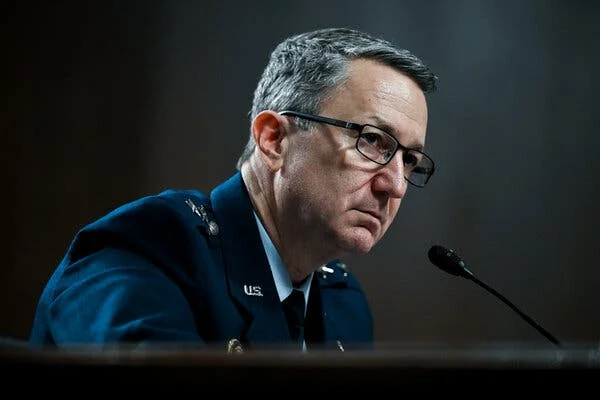
Dan Caine Confirmed As Chairman Of Joint Chiefs Amidst Tumultuous Pentagon Shakeup
The U.S. Senate has confirmed retired Air Force Lt. Gen. Dan “Razin” Caine as the new chairman of the Joint Chiefs of Staff, marking a dramatic turn in military leadership under President Donald Trump’s administration. The vote, held in the early hours of Friday, fills a critical post at the pinnacle of America’s military hierarchy after a period of abrupt and controversial shakeups at the Pentagon.

Caine’s path to America’s top military advisory post was anything but conventional. Nominated by Trump after the sudden dismissal of his predecessor, Gen. CQ Brown Jr., Caine’s confirmation comes after weeks of political wrangling. Brown, the Air Force’s second Black general to serve as chairman, fell victim to the administration’s new direction on military leadership, with Trump seeking to root out supporters of diversity initiatives.
The Senate confirmed Caine with a 60-25 vote, reflecting bipartisan backing despite Democratic reservations. As the nation’s senior military adviser, Caine steps into a role that has grown more isolated from policy influence since a flurry of Trump-appointed firings destabilized the Pentagon's inner circle.

General Caine brings a decorated record as an F-16 pilot and experience in special operations, classified Pentagon programs, and as associate director of military affairs at the CIA. However, he breaks precedent as the first National Guard general—and the first since the role’s creation—not previously a four-star officer, combatant commander, or service chief. Trump’s nomination required bypassing legal prerequisites, a step justified "in the national interest."
At his Senate hearing, Caine acknowledged the uniqueness of his appointment. “In our family, we serve. When asked, we always say yes. Senators, I acknowledge that I'm an unconventional nominee. These are unconventional times,” he testified. Lawmakers pressed him on whether he would resist politicization and provide honest military counsel. "Senator, I think that’s the duty and the job that I have, yes," he assured Sen. Elissa Slotkin (D-Mich.). Democrats, wary of further eroding anti-discrimination policies, appeared to accept Caine as the best option amid limited choices.

Caine’s loyalty to nonpartisanship was also scrutinized. Trump claimed Caine wore a red "Make America Great Again" hat at their first meeting—a charge Caine flatly denied: "For 34 years, I've upheld my oath of office and my commitment to my commission, and I have never worn any political merchandise." His military record includes a pivotal 2018 meeting with Trump at Al Asad airbase in Iraq, where he advised that ISIS could be rapidly defeated with fewer engagement restrictions.
The broader implications are significant. Caine inherits a Pentagon at a crossroads—navigating new conflict escalation with Iran-backed militants in Yemen, questions over US support for Ukraine, and internal debates on maintaining an apolitical force. His confirmation process was less fraught than that of Defense Secretary Pete Hegseth, emphasizing Senate urgency for military clarity as global and domestic tensions rise.
With the echoes of former chairman Mark Milley’s ouster—his portrait and security clearance removed within hours of Trump’s return to office—the stage is set for a new kind of military leadership, rooted in loyalty, but under immense scrutiny to remain apolitical and independent. As Sen. Jack Reed (D-R.I.) put it, “I expect you to pledge to always provide your best military advice to the president and the secretary of defense. Even if that advice is not what they would want to hear.”
Caine’s leadership will soon be tested as he seeks to reestablish the relevance of the Joint Chiefs amid challenging domestic currents and a rapidly evolving global threat environment. Will his promise to "speak truth to power" hold? Readers, share your views on what this means for America’s military and global standing in the comments below.